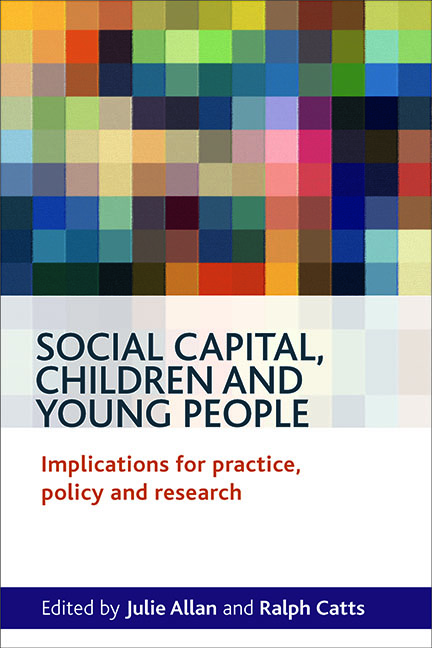eight - Social capital, diversity and inclusion: lessons from one primary school
Published online by Cambridge University Press: 01 September 2022
Summary
Many have written about the possibilities and limitations of social capital as a concept (Garmanikow and Green, 1999; Dika and Singh, 2002; Smyth, 2004). Some suggest that the term is so ubiquitous that it is now not clear if the concept is an ‘analytical tool or a clingfilm wrap’ (Schuller, 1999; Shucksmith, 2000) and it is difficult to distinguish between what is meaningful and what is nonsense (Garmanikow and Green 1999). However, social capital ‘has been identified as having significant potential for reducing disadvantage, improving educational outcomes and enhancing health and well-being’ (Allan et al, 2009 p. xiv) and it has been acknowledged that ‘child development is powerfully shaped by social capital’ (Putnam, 2000, p. 296). When this concept was being introduced into the education communities in Scotland through the Applied Educational Research Scheme (AERS), a primary school (which we shall now call Fairforall Primary) provided an interesting example from which to explore the concept of social capital as well as its potential for promoting inclusion and social justice.
Fairforall Primary: background
Fairforall Primary has 280 pupils and a staff of 18 and is located in an area where individuals face multiple discriminations at personal, cultural and social levels. The primary issue affecting pupils in the school's catchment area is poverty. Over two thirds of the pupils are on free school meals. Many are in cared for or fostered situations and the school regularly receives pupils with interrupted education. The nursery has the largest number of free full-time places in the local authority. While poverty is the main issue other social issues exist related to ethnicity (racism) and gender (domestic violence), as well as drug- and alcohol-related problems.
The school is a product of the merger of two schools with falling roll numbers. Within five years of merger, when this study took place, the new school looked as though it had successfully built a whole new culture where staff, parents and pupils were developing productive friendships, partnerships and networks. In this chapter, the term ‘parent’ is used to cover a range of people that look after children, including carers, foster parents and grandparents. The school boasts a reputation across the authority and nationally of being an inclusive school. A voiced philosophy is that the ‘school never gives up on a child. We often accept and include children that others have given up on’ (Arshad and Maclennan, 2008, p. 7).
- Type
- Chapter
- Information
- Social Capital, Children and Young PeopleImplications for Practice, Policy and Research, pp. 137 - 158Publisher: Bristol University PressPrint publication year: 2012



